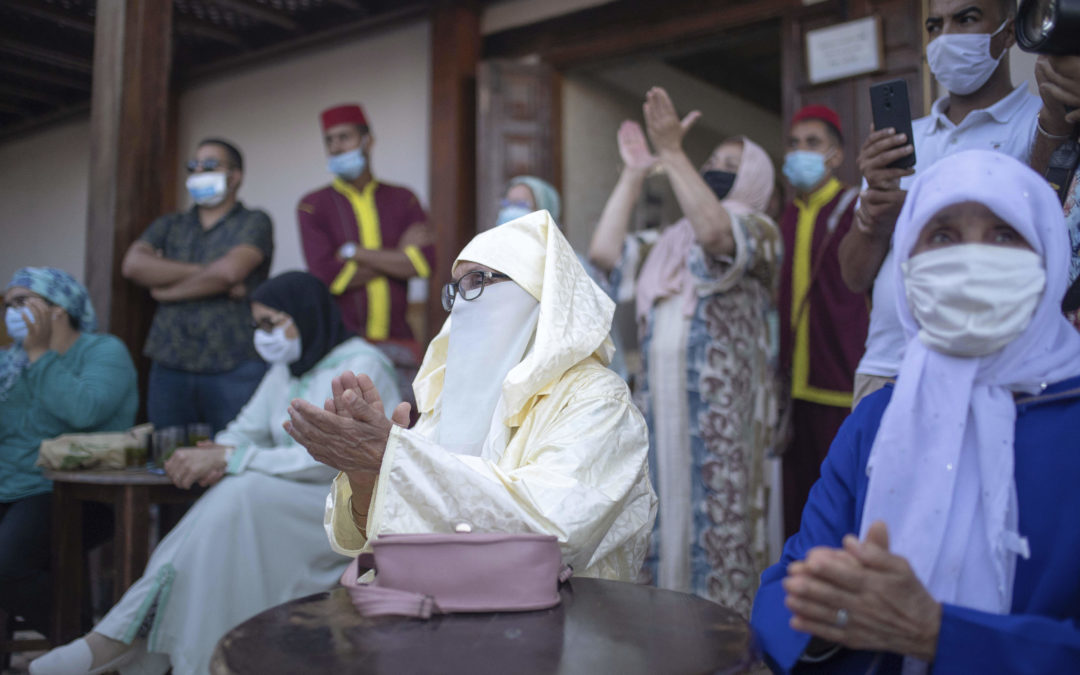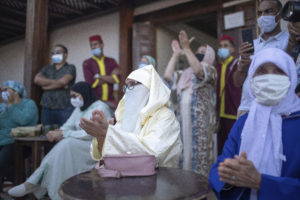by Omar Suleiman, RNS | Feb 8, 2022 | Commentary, Headline News, Social Justice |
(RNS) — Over the past week, much of the world was gripped by the heartbreaking story of Rayan, a 5-year-old boy who had plunged 104 feet into a well in Morocco. For five days thousands of people went to Tamorot in northern Morocco to help and pray, while around the world hundreds of millions followed closely. On Saturday evening (Feb. 5), hopes rose as he was pulled out of the deep shaft, but the jubilation was short-lived as the news broke within minutes that he had passed away.
Images of Rayan, his grieving mother and the heroic rescue effort united much of the world around what practically no one could find disagreeable: the hope that an innocent child caught in devastating circumstances could be reunited in health and safety with his worried parents.
For many of us as Rayan departed this world, we still pray for that reunion in the next life, and are moved to contribute to his grieving family in any way that we can.
For readers of Scripture, Rayan’s time in the well brought to mind the story of Joseph, the son of Jacob (peace be upon them), in the Quran, similar to that of the Bible. In the Quran, however, Joseph’s time in the well is a focal point of an entire chapter that offers comfort to those facing a trial.
Rayan, certainly, was not thrown into the Moroccan well by envious brothers, as Joseph was. Poor infrastructure seems to have been the main reason for his death, and the fact that no one was to blame made it easy to gather everyone in sympathy.
But I can’t help but wonder while watching this unfold how differently the story of Rayan would be told, or if it would be told at all, had he been a child stuck in a crater caused by an airstrike from a military drone. Or if he was a refugee who had slipped to his death in a camp.
Figures are not for a blameless child to die due to unnecessary war. Some 1,600 children died or were maimed in Afghanistan every year for two decades, according to Save the Children, which also estimates that 25 children die or are injured each day in conflicts around the world.
Cruelty to a child is one of the few things that can still elicit a pure human reaction from most of us. It’s why the mother of Emmett Till wanted to leave the casket open after her son’s brutal murder. In her own words, “I wanted the world to see what they did to my boy.” By doing so, she sparked the civil rights movement.
It’s why the image of baby Alan Kurdi, a Syrian refugee who washed ashore at a Turkish resort, shocked the world in a way that statistics never could. It’s why the image of over 60 Palestinian children on the cover of The New York Times did more to humanize the plight of the Palestinian people than almost all the coverage of the bombardment of Gaza combined. And it’s why the image of young Jakelin Caal, who died trying to cross the border into the United States, shook so many of us to our core.
We despise the unjust death of children, but when children die in war we feel complicit in that injustice, either through our participation in harmful policies or silence about the consequences. Many of the powers directly responsible for children’s deaths are aware of our disgust and will try to thwart coverage or sympathy that may lead to direct challenges of their use of force.
We’re told to sympathize with the child who resembles Joseph. It’s far harder for us to see ourselves as the brothers who threw him into the well.
While the brothers of Joseph were driven by envy, we’re driven by greed or apathy. The reason doesn’t matter to the child. Our repentance is to do what we can for that child, and the other children who need our help.
Rayan was a beautiful, innocent child who brought out the best of his countrymen, and the purest of sentiments from around the world. How do we then reckon with the harm of so many unholy wars and man-made tragedies in which so many beautiful children die in ugly ways? What is the work we need to do so that they may live in dignity and calm?
(The views expressed in this opinion piece do not necessarily reflect those of Religion News Service.)

by Allen Reynolds, UrbanFaith Editor | Sep 10, 2021 | Headline News |

People attend a political rally for Aziz Akhannouch, Moroccan businessman and head of the RNI party, in Rabat, Morocco, Thursday, Sept. 2, 2021, days before the upcoming legislative and regional elections. Millions of Moroccans head to the polls on Sept. 8 to cast ballots in pivotal legislative and regional elections amid strict safety guidelines as the north African country is grappling with a new wave of COVID-19, driven mainly by the Delta variant. (AP Photo/Mosa’ab Elshamy)
RABAT, Morocco (AP) — Moroccans voted Wednesday for a new parliament and local leaders in elections that have been reshaped by the pandemic, and whose outcome is hard to predict as opinion polls were not allowed.
Candidates promised to create jobs and boost Morocco’s economy, education and health care. The kingdom has been hit hard by the pandemic, but has Africa’s highest vaccination rate so far.
Despite a dip in popularity in recent years, the governing Islamist party is eyeing a third term at the helm of the government if it again wins the most parliament seats. But a recent election reform could limits its powers, and the role of lawmakers is limited by the powers of King Mohamed VI, who oversees strategic decision-making.
“I hope that the people we voted for do not disappoint us,” said voter Adel Khanoussi, casting his ballot in the capital Rabat. “There are so many projects that should be implemented. The people’s expectations are high.”
Turnout was 36% three hours before polls closed.
The outcome of Wednesday’s voting is difficult to predict since opinion polls on elections are banned. The race will likely be close and no matter which party comes first, it will likely need to cobble together a coalition with other parties to form the government.
At a school turned polling station in Temara, near the capital, dozens of people stopped in to vote before going to work. Two security officers were stationed outside, and a poll worker took voters’ temperatures before letting them in.
Once inside, voters are asked to provide their identity cards and hand over their phones before entering the booth. They’re required to use hand sanitizer, wear a mask and keep 1-meter (3-foot) distances.
A 36-year-old woman who only gave her name as Fatima said she hopes the parliament can bring a “new Morocco” seen as an advanced world country.
While Morocco has one of the region’s strongest economies and a thriving business district in Casablanca, poverty and unemployment are also widespread, especially in rural regions. Morocco has seen thousands of despairing youth make risky, often deadly, trips in small boats to Spain’s Canary Islands or to the Spanish mainland via the Strait of Gibraltar.
Strict pandemic guidelines restricted candidates’ ability to reach the 18 million eligible voters. Candidates weren’t allowed to distribute leaflets and had to limit campaign gatherings to a maximum of 25 people. As a result, many stepped up efforts on social media instead.
Morocco has registered more than 13,000 COVID-19-related deaths since the start of the pandemic, according to figures from the Moroccan Health Ministry.
There were 31 parties and coalitions competing for the 395 seats in the lower house of parliament. Voters will also be selecting representatives for 678 seats in regional councils.
The moderate Islamist Justice and Development Party (PJD), at the helm of the government since 2011, is seeking a third term. With Prime Minister Saad-Eddine El Othmani, the party has campaigned on raising the competitiveness of Morocco’s economy.
El Othmani acknowledged that turnout is a “challenge” in a country where many are disillusioned with politics, but said he was encouraged at his voting station to see “good participation of voters of both sexes.”
Other major contenders are the center-left Party of Authenticity and Modernity, or PAM, the Istiqlal party and the liberal National Rally of Independents.
Istiqlal general secretary Nizar Baraka said the new parliament should “work for the people to get them out of poverty and stop the deterioration of the middle class.”
The elections were monitored by 4,600 local observers and 100 more from abroad.


